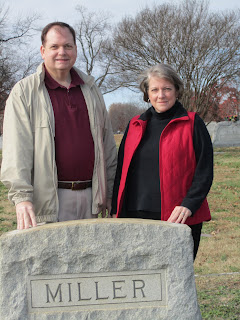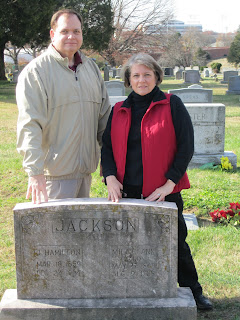This scrapblog seeks to preserve a family history and to honor the memory of twins Brother and Cissie, who were wonderful human beings and parents, as well as those of their sisters, Norma Martin Cashion and Marilyn Miller. In addition, it seeks to show how personal and family history always are shaped by and shape the history of a nation and its culture, and how, in the end, we are all linked, one way or another.
 The twins, shown here in late 1925, were dubbed Brother and Cissie. Note Brother's oddly shaped head, the result of his being cramped in the womb. His parents worried about it and bound it in cloths to reshape it, with some success. His classmates teased him about it unmercifully, calling him "Egg." His kids, however, would have been unnerved to have him any other way.
The twins, shown here in late 1925, were dubbed Brother and Cissie. Note Brother's oddly shaped head, the result of his being cramped in the womb. His parents worried about it and bound it in cloths to reshape it, with some success. His classmates teased him about it unmercifully, calling him "Egg." His kids, however, would have been unnerved to have him any other way. Cissie and Brother were best friends their entire lives, even when far away from each other as their lives took different paths. When Cissie died in 1993, Brother told his wife and family that he felt a deep emptiness inside.
Cissie and Brother were best friends their entire lives, even when far away from each other as their lives took different paths. When Cissie died in 1993, Brother told his wife and family that he felt a deep emptiness inside. Cissie, left, and Brother, with his cousin Virginia Holcomb's dog, Prince (Brother LOVED dogs, a happy passion inherited by his daughter Chats), posed with friends and beloved cousin Virginia (later Harris) on a hot summer's day in the late 1930s.
Cissie, left, and Brother, with his cousin Virginia Holcomb's dog, Prince (Brother LOVED dogs, a happy passion inherited by his daughter Chats), posed with friends and beloved cousin Virginia (later Harris) on a hot summer's day in the late 1930s. The twins turned 16 on Easter Sunday 1941.
The twins turned 16 on Easter Sunday 1941. Brother and Cissie, all dressed up, sometime before Brother was drafted into the U.S. Army, which eventually would become his career, and headed for Europe to fight in World War II.
Brother and Cissie, all dressed up, sometime before Brother was drafted into the U.S. Army, which eventually would become his career, and headed for Europe to fight in World War II. Brother, Cissie and Cissie's husband, Bill Edwards, in the 1950s. The twins didn't look much alike -- Brother had green eyes and light hair and Cissie had brown eyes and dark hair -- but they had identical smiles.
Brother, Cissie and Cissie's husband, Bill Edwards, in the 1950s. The twins didn't look much alike -- Brother had green eyes and light hair and Cissie had brown eyes and dark hair -- but they had identical smiles.
 Clyde Clifton Miller (May 30, 1894-Aug. 5, 1938) and Mamie Louella Jackson (March 26, 1895-Oct. 7, 1951) were married on June 25, 1916, in North Carolina. Mamie was a widow whose first husband, Charles Norman Martin Sr. (1899-Nov. 4, 1918) had died in the great influenza epidemic. She had a stepson, Charles Norman Martin Jr. (Sept. 15, 1913-) and a baby girl, Norma Louise Martin (July 6, 1917-June 17, 2009).
Clyde Clifton Miller (May 30, 1894-Aug. 5, 1938) and Mamie Louella Jackson (March 26, 1895-Oct. 7, 1951) were married on June 25, 1916, in North Carolina. Mamie was a widow whose first husband, Charles Norman Martin Sr. (1899-Nov. 4, 1918) had died in the great influenza epidemic. She had a stepson, Charles Norman Martin Jr. (Sept. 15, 1913-) and a baby girl, Norma Louise Martin (July 6, 1917-June 17, 2009).







 Marilyn in April 1944.
Marilyn in April 1944.
 Marilyn, a talented oil painter, with her work "Praying Hands" in 1963.
Marilyn, a talented oil painter, with her work "Praying Hands" in 1963.
 Norma, Cissie, Marilyn and Brother in 1980.
Norma, Cissie, Marilyn and Brother in 1980. Norma, Brother and Cissie in September 1991. All are gone now from this world, but never forgotten.
Norma, Brother and Cissie in September 1991. All are gone now from this world, but never forgotten.





 That's Mamie in the middle of the back row. We're not sure who all the people in this photo are, but we're very sure of some of them, including beaming Brother, Cissie and Marilyn, in the front row. The back of the photo says: Front row: Roy Lee, Brother, Marilyn, Cissie. Second row: Anna Frances. Third row: Virginia Holcomb, Dude, Mamie, Ola. Fourth row: Grandma (Tennessee Isabelle Gough Miller), Thelma.
That's Mamie in the middle of the back row. We're not sure who all the people in this photo are, but we're very sure of some of them, including beaming Brother, Cissie and Marilyn, in the front row. The back of the photo says: Front row: Roy Lee, Brother, Marilyn, Cissie. Second row: Anna Frances. Third row: Virginia Holcomb, Dude, Mamie, Ola. Fourth row: Grandma (Tennessee Isabelle Gough Miller), Thelma. Mamie (second from left) in 1945 with daughters Norma, Marilyn and Cissie.
Mamie (second from left) in 1945 with daughters Norma, Marilyn and Cissie.



















 He enlisted in the U.S. Army in 1944. It was to become his career.
He enlisted in the U.S. Army in 1944. It was to become his career.
 Sort of a "beat" look, don't you think?
Sort of a "beat" look, don't you think? Brother in 1951, a few years into his Army career.
Brother in 1951, a few years into his Army career.

